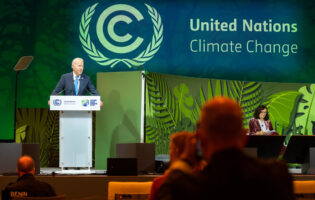German Economic Leadership in Europe: More Uncertain and More Needed

Peter S. Rashish
Vice President; Director, Geoeconomics Program
Peter S. Rashish, who counts over 25 years of experience counseling corporations, think tanks, foundations, and international organizations on transatlantic trade and economic strategy, is Vice President and Director of the Geoeconomics Program at AICGS. He also writes The Wider Atlantic blog.
Mr. Rashish has served as Vice President for Europe and Eurasia at the U.S. Chamber of Commerce, where he spearheaded the Chamber’s advocacy ahead of the launch of the Transatlantic Trade and Investment Partnership. Previously, Mr. Rashish was a Senior Advisor for Europe at McLarty Associates, and has held positions as Executive Vice President of the European Institute, on the Paris-based staff of the International Energy Agency, and as a consultant to the World Bank, the German Marshall Fund of the United States, the Atlantic Council, the Bertelsmann Foundation, and the United Nations Conference on Trade and Development.
Mr. Rashish has testified on the euro zone and U.S.-European economic relations before the House Financial Services Subcommittee on International Monetary Policy and Trade and the House Foreign Affairs Subcommittee on Europe and Eurasia and has advised three U.S. presidential campaigns. He is a member of the Board of Directors of the Jean Monnet Institute in Paris and a Senior Advisor to the European Policy Centre in Brussels. His commentaries have been published in The New York Times, the Financial Times, The Wall Street Journal, Foreign Policy, and The National Interest, and he has appeared on PBS, CNBC, CNN, and NPR.
He earned a BA from Harvard College and an M.Phil. in international relations from Oxford University. He speaks French, German, Italian, and Spanish.
__
- The instability produced by the failure to form a so-called “Jamaica” coalition in Germany increases the importance of moving from reliance on de facto German leadership of the Eurozone to a more institutionalized approach.
- Progress on strengthening the euro will not be able to move forward until the idea that the Eurozone is a “transfer union” where Germany foots the bill for less performing economies is put aside once and for all.
- Impatience with multilateral economic governance is rising on both sides of the Atlantic. Germany, working with its EU partners, needs to restate the case that sharing sovereignty under the right terms is a multiplier of prosperity and the national interest.
A common European approach to the challenge presented by Chinese inward investment, particularly by its state-owned enterprises, offers one avenue for demonstrating how French president Macron’s “Europe that protects” without protectionism in the face of globalization can work in practice.
From Unstable Politics to Stable Institutions
From an economic standpoint, the most important thing that was at stake in the September 24 German elections was how strongly the new governing coalition that emerged from the vote would commit to shock-proofing the euro. Translated in terms of EU political dynamics, the question was: to what extent would Berlin help to restart the Franco-German motor of European integration by embracing the ambitious vision for Eurozone governance—among other ideas a Eurozone finance minister, budget, and parliament—put forward by French president Emmanuel Macron?
Now that the coalition talks in Berlin among the Christian Democrats, Free Democrats, and Greens have broken down, and Chancellor Merkel is looking somewhat less invincible, it is legitimate to ask if she will have the political muscle to rally public opinion behind any major reforms to make the common currency more growth friendly and more resilient to external shocks. Whether that is true or not, the fact remains that the minor revolution that has occurred in German politics—with heretofore unheard-of talk of minority government, new elections, or a kind of national emergency replay of the outgoing grand coalition—only makes the shift from ad hoc political management of the euro to a more long-term, institutional approach all the more necessary.
At a time when even Germany, the EU’s political and economic powerhouse, is showing that it, too, is not immune to the political splintering and clannishness that is plaguing Western societies, the EU would be wise not to rely on a government of the day in Berlin or Paris to mend what ails the Eurozone. And while the establishment in 2012 of the European Stability Mechanism (ESM) to assist countries with short-term financing needs and the European Central Bank’s aggressive bond buying have helped to avoid the worst, neither of these institutions has enough firepower to either forestall or manage a major crisis should one come.
An EU “Transfer Union”: Real or Imaginary?
Whatever the coalition that emerges from the unprecedented uncertainty reigning in Berlin, even a wounded Germany will inevitably play a leading role in designing Europe’s future economic institutions. No other country combines the economic heft and soft power that Germany does. That the country’s balance of free-market philosophy and welfare-state protections—the “social market economy”—puts it squarely in Europe’s ideological center of gravity also helps make its de facto leadership acceptable, if not always comfortable, for the other 27 members of the EU. And that moderate reputation will continue to be valuable at a time when France, even under a liberal reformist like Emmanuel Macron, has not yet shed its reputation for a remote, centralizing approach to governing.
Given the political realities in Germany, however, that same France is now more essential than ever to progress on Europe’s economic future. There is simply no escaping that Germany will need the dynamism coming from France that Berlin will now have in shorter supply because of domestic upheaval. That means that what was always going to be a high-wire act—reaching compromise with Macron and finding a political majority for that compromise at home—will become even more of a feat. But unless the chancellor has abandoned her ambition to make a more stable and prosperous European Union the main legacy of her (still likely) four terms in office, it is one she will have no choice but to pursue whatever the headwinds.
A good place to start in that effort would be for her to address directly the idea that the Eurozone is or could become a “transfer union.” This notion is Germany’s recurring nightmare whenever greater integration of the 19-member common currency area is put forward: that the riches derived from Germany’s prudent fiscal management will be used to compensate for the poorer economic performance of less-disciplined countries. If there is to be any chance of guaranteeing the euro’s long-term survival, the chancellor needs to convince skeptical Germans this will not be the case.
If one day the ESM is turned into a much more powerful European Monetary Fund (EMF) that Germany would pay the lion’s share of, such a fund would need to have strict conditions for lending to help countries in distress. But by promoting stronger and more sustainable economic growth in Europe, the EMF would benefit Germany itself. The chancellor needs to remind her compatriots that Germany’s trade surplus is in part due to the low value of the euro compared to where the deutsche mark would have been today. And by underpinning the EU single market, the euro has contributed to Germany’s strong export performance within it. With the right conditionality for its loans, German contributions to the EMF to support stability and growth in the Eurozone would ultimately be an investment in its own future.
With the transfer union put aside as the straw man that it is, the path should be open for a compelling Franco-German project on Eurozone reform. But however central it is to create a durable common currency, that is not the only obligation to preserve and reinforce the economic pillar of the liberal international order that the next German government will face.
Multilateral Governance vs. “Taking Back Control”
The new government in Berlin will be taking office when the force of the idea first raised by the advocates of Brexit in the UK—taking back control from far-away authorities—has yet to play out. Beyond the challenge stemming from Britain’s withdrawal from the EU, there is a testiness in both Europe and the United States toward multilateral governance more broadly. Whether it was opposition from both Democrats and Republicans to the Trans-Pacific Partnership, street demonstrations against the Transatlantic Trade and Investment Partnership in Germany, or President Trump’s current ramping up of U.S. displeasure with the dispute settlement process of the World Trade Organization, the myth that countries can best pursue their national interests on their own has taken root in transatlantic discourse.
The causes of this “withdrawalism” are not hard to identify: a generalized uncertainty about rapid change, especially from technological innovation, as well as a fear of foreigners, of the “other”—whether in the form of immigrants or entangling international agreements requiring compromise with trading partners.
Germany, working with its EU partners, will need to help counter this notion and to demonstrate that multilateralism, done the right way, can actually be a multiplier of Western values and interests. Restating the case for the European Union, the form of shared sovereignty that is closest to home, would be a useful way to set the stage. Here, President Macron’s emphasis on a “Europe that protects” but that does not engage in protectionism is an example of effective political communication that can serve as a model for Germany, facing its own Euro-skeptical Alternative for Germany party, and other mainstream pro-European parties. The idea that the EU is a vehicle for managing globalization better than any individual member country could alone needs to find a wider audience.
One concrete way to demonstrate that the EU is a net plus for its citizens in the face of global economic uncertainty would be for Germany to continue the forward-leaning work it is doing with France and Italy to consider how the EU can be better equipped to ensure that inward investment continues to create prosperity while reinforcing its global economic position. Germany could, among other avenues, look more closely at the way Chinese state-owned enterprises operate in the EU and find ways to encourage more Chinese greenfield investment that creates jobs without potentially putting at risk sensitive technologies.
…
Germany has become accustomed to being the EU’s leader. In the coming years, its leadership will continue to be essential—not as an end itself, but rather to hasten the day when its somewhat lonely role at the top will be less necessary because reformed and empowered European institutions and economic governance will take their rightful place.








